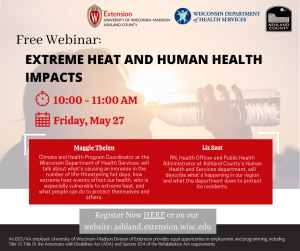You can watch a recording of the program here.
This one-hour video explores the relationship of changing climate conditions and the increase of heat-related illnesses in Wisconsin. As climate change causes the number and severity of extreme heat days and night to increase, more people, especially vulnerable populations are experiencing mild to severe health conditions.
Original Post
 Though Wisconsin is notorious for frigid winters, extreme heat kills more people in the state than all other weather disasters (like tornadoes, floods, blizzards) combined. Just as the human body can freeze to death when temperatures are too cold, it can also stop functioning properly when it cannot dissipate excessive heat.
Though Wisconsin is notorious for frigid winters, extreme heat kills more people in the state than all other weather disasters (like tornadoes, floods, blizzards) combined. Just as the human body can freeze to death when temperatures are too cold, it can also stop functioning properly when it cannot dissipate excessive heat.
For example, at least 68 people died during an extreme heat event in 1995 in Wisconsin, when temperatures soared over 90 ºF for seven consecutive days. On the hottest days with high humidity, temperatures felt like they were over 120 ºF.
- Maggie Thelen: Climate and Health Program Coordinator at the Wisconsin Department of Health Services, will talk about what’s causing an increase in the number of life-threatening hot days, how extreme heat events affect our health, who is especially vulnerable to extreme heat, and what people can do to protect themselves and others.
- Liz Szot: RN, Health Officer and Public Health Administrator at Ashland County’s Human Health and Services department, will describe what’s happening in our region and what the department does to protect its residents.
Interesting Information
- Wisconsin Department of Health Services factsheet about climate changes and human health impacts
https://www.dhs.wisconsin.gov/publications/p00709b.pdf
- Wisconsin Department of Health Services web page for heat impacts and actions, including a short video on how to protect yourself and others.
https://www.dhs.wisconsin.gov/climate/heat.htm
- Ashland County has been identified as a county with a “Moderately High” Heat Vulnerability Index.
- What is a Heat Vulnerability Index and why is it important?
The program will be recorded and posted on the Ashland County UW Extension web site following the presentation.
The program is offered in partnership with UW Madison’s Division of Wisconsin-Ashland County, Wisconsin Department of Health Services, and the Ashland County Human Health and Services department.
For more information, call 715-682-7017.




